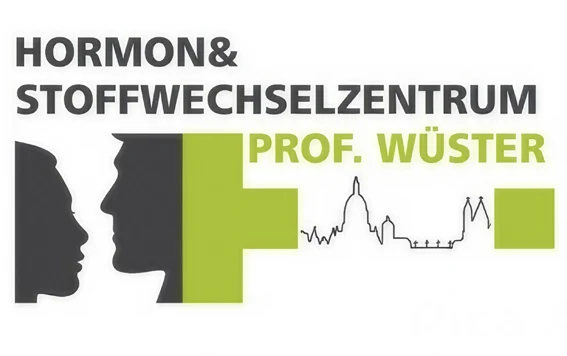Hormone therapy in Mainz: Is your thyroid functioning?
Thyroid hormones influence the entire metabolism
The entire metabolism is determined by the hormones of the thyroid gland. The effects of hyperthyroidism or hypothyroidism are therefore manifold: digestion, libido, general well-being or mood, ability to concentrate. The symptoms are typical and should be taken seriously. Prof Dr Christian Wüster, an endocrinologist in private practice in Mainz, carries out thyroid tests in his practice laboratory. These tests quickly provide very reliable and precise information. Based on these results, the endocrinologist plans thyroid therapy together with his patients.
Endocrinologist in Mainz carries out thyroid tests in his practice laboratory
The thyroid gland (Latin: glandula thyreoida or glandula thyroidea) is a very important endocrine gland that is located in humans below the larynx and directly in front of the windpipe. It has the shape of a butterfly. The thyroid gland stores iodine and produces the iodine-containing hormones thyroxine and triiodothyronine as well as the hormone calcitonin. The iodine-containing hormones play a central role in energy metabolism. In particular, they control growth. The thyroid hormone calcitonin ensures long-term stability by ensuring the storage of calcium and phosphate in the bones; its determination serves as a tumour marker for C-cell carcinoma of the thyroid gland.
If the thyroid gland does not function properly, numerous diseases can be the result
The thyroid gland does not function properly in almost one in three people. A thyroid disorder does not always lead to an impairment of the patient. A goitre, for example, does not necessarily have an effect on a person’s well-being. However, the consequences of thyroid disease can also be serious. At a glance: Information on diseases that can be caused by a thyroid gland that is not functioning properly:
Hyperthyroidism (hyperthyroidism)
- Cause: The thyroid gland produces too much thyroxine and triiodothyronine.
- Symptoms: Enlarged thyroid gland, weight loss, nervousness, trembling, diarrhoea, sweating.
- Therapy: Treatment with medication (thyreostatics). Radioiodine therapy if necessary. In rare cases, surgery is advisable.
Underactive thyroid (hypothyroidism)
- Cause: Insufficient supply of the body with the thyroid hormones triiodothyronine and thyroxine.
- Symptoms: As the body’s metabolism slows down due to the hormonal undersupply, this results in listlessness and low physical and mental performance.
- Therapy: Can be treated well with medication (hormone therapy).
Goitre (goitre)
- Cause: If the thyroid gland enlarges, a goitre develops, medically known as a goitre. Iodine deficiency is usually the cause.
- Symptoms: Translated from Latin, goiter means “swollen gland on the neck”. The thyroid gland enlarges. Around 30 percent of Germans have a goiter. Women are 4-5 times more likely to suffer from a goiter.
- Therapy: The aim of the therapy is to achieve a normal-sized thyroid gland. A goiter can be treated very well with medication (which can contain iodine and the thyroid hormones levothyroxine and thyroxine). Other forms of therapy: Thyroid surgery and radiation.
Graves’ disease (Graves’ disease)
- Cause: Autoimmune disease of the thyroid gland, which is often accompanied by an overactive thyroid gland (hyperthyroidism) and a goiter (goiter).
- Symptoms: Insomnia, nervousness, irritability, tremors, restlessness, hot flashes, sweating, tightness, infertility, osteoporosis.
- Therapy: Graves’ disease is mainly treated with radioiodine therapy (radioactive therapy) or surgery.
Hashimoto thyroiditis (autoimmune thyroid inflammation)
- Causes: genetic predisposition, infections, high physical and psychological stress; autoimmune disease of the thyroid. Antibodies are directed against the thyroid tissue. The result is inflammation. Thyroid hormones can no longer be produced in sufficient quantities (underactive thyroid). Hashimoto thyroiditis progresses very differently. Women are affected far more often than men.
- Symptoms: Typical symptoms of overactive thyroid occur.
- Treatment: The main therapy is the treatment of underactive thyroid with the hormone thyroxine.
Thyroid carcinoma (thyroid cancer)
- Cause: not fully understood; radiation, iodine deficiency
- Symptoms: formation of nodules, enlargement in the area of the thyroid. Often associated with hoarseness.
- Treatment: surgery and radioiodine therapy.
Hyperparathyroidism (HPT: dysfunction of the parathyroid glands)
- Cause: benign growth and overactivity of the parathyroid gland.
- Symptoms: An excess of parathyroid hormone causes the calcium level in the blood to rise.
- Treatment: Hyperparathyroidism is mainly treated surgically.
Image for the article Hormone therapy: © Irbis-Nariel/Fotolia

